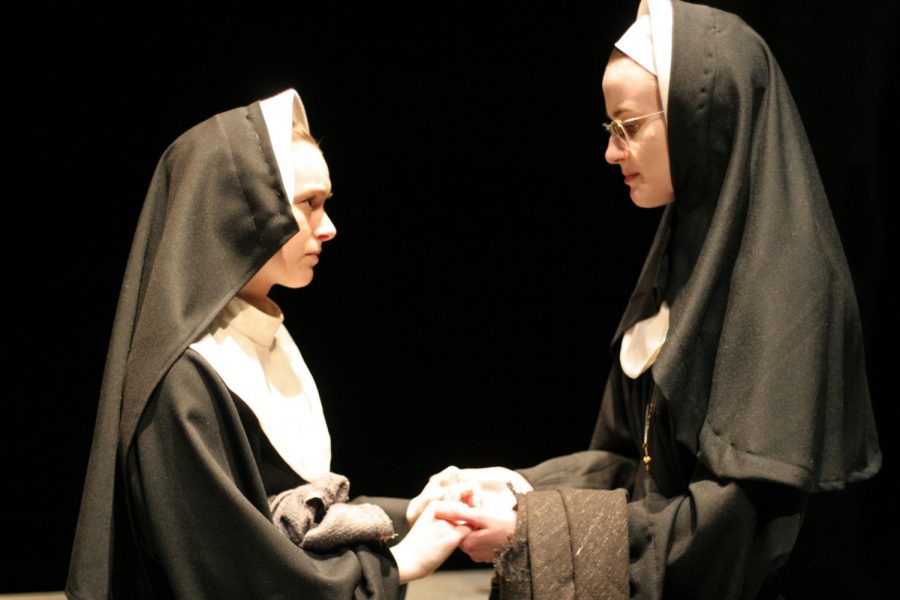TheatreUNI explores ‘Doubt’
TheatreUNI presented “Doubt: A Parable” in the Bertha-Martin Theatre from Thursday, April 5 through 8, and it will continue to run Thursday, April 12 through April 15 at 7:30 p.m. It is free to UNI students.
Apr 12, 2018
“Doubt: A Parable” is a 2004 play by John Patrick Shanley. The play takes place in the fictional St. Nicholas Church School, located in the Bronx, during the fall of 1964. The driving theme of “Doubt” is introduced in the first scene with a sermon from the main character, Father Flynn, where he points out: “Doubt can be a bond as powerful and sustaining as certainty.”
The idea of doubt delves deeper and deeper as the play goes on and is especially apparent when Sister Aloysius expresses her certainty that Father Flynn had a sexually inappropriate encounter with a student after pulling him aside privately after church and reprimanding him for drinking altar wine.
The play won the 2005 Pulitzer Prize for Drama and a Tony Award for Best Play and was also turned into an Academy Award-nominated film starring Philip Seymour Hoffman as Father Flynn and Meryl Streep as Sister Aloysius.
Theatre UNI put on a performance of “Doubt” that not only had me questioning Father Flynn’s integrity, but had me questioning the validity of my own preconceived judgements.
This performance of “Doubt” was directed by Steve Taft, associate theatre professor, and the cast of just four characters. However, the small cast did not equate small performances. Each character put forth riveting performances that had my mind spinning and doubting throughout.
Noah Hynick portrayed a progressive and compassionate Father Flynn and had me nearly convinced throughout the play that he was innocent. He was kind to the children, as well as to Sister James, the classroom teacher of the child he had the accusation with, however, my overly active mind couldn’t help but wonder if this was all just a front. Preachers are people who are supposedly trustable, yet in reality, nobody is completely pure and absent of sin. This is, of course, the point of the play. “Doubt” is a powerful force.
Another noteworthy performance was that of Savanna Burkle, who played Sister Aloysius Beauvier, the principal at the school. I cannot stress enough the power of Burkle’s performance. Her performance was what brought the tiny sliver of suspicion into my mind that Father Flynn might be guilty, even though her character had no proven evidence that he was at fault.
From there on out, it was a battle with my own mind. I juggled his innocence back and forth and back and forth, and her crazed desperation to catch him in his act became my crazed desperation, too.
What really struck me was Sister Aloysius’ “gut feeling,” which kept her motivated during her own private investigation. Her reasonings brought me back to my childhood when my parents would urge me to make good decisions, and if I was to ever find myself in a tough situation, to just go with my “gut instinct.” So, I empathized with Sister Aloysius’ instinct to protect her students at all costs. But, just as we have all struggled in our lives, I had a difficult time finding truth in a “gut feeling” when the facts didn’t align with it.
This play is one that depends greatly on its actors’ portrayal of the characters, because the interpretation can vary tremendously depending on how convincing the actors of Father Flynn and Sister Aloysius want to be. Because of the open-ended nature of the ending, viewer interpretation varies greatly. You are meant to feel uncomfortable and unsatisfied, and that is because of the doubt in your mind.
Theatre UNI’s adaptation of “Doubt” was powerful and abstract, and I truly appreciated that I not only had to think critically during the play, but it also left me with questions to sort out in my mind far after the play had ended.








